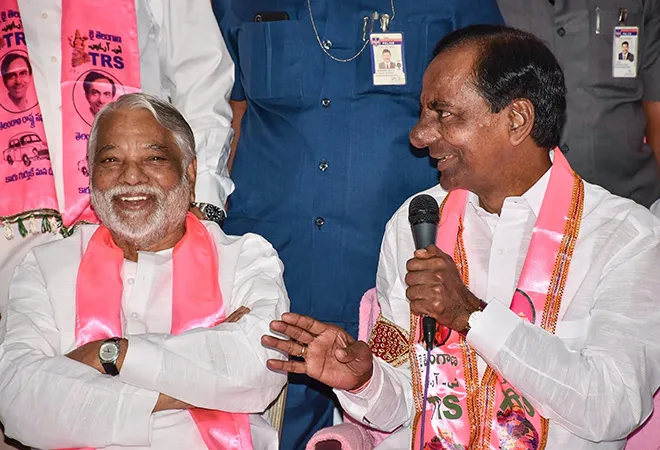-
CENTRES
Progammes & Centres
Location
Undoubtedly, there is both scope as well as a need for a third front. However, there are many inherent contradictions for such a front to succeed.

Image Source: PTI
After his victory in the recently held assembly elections in which Telangana Rashtra Samithi (TRS) won 88 seats out of total 119, Telangana Chief Minister K. Chandra Shekhar Rao (KCR) has renewed his efforts to form a non-Congress and non-BJP front that he has christened as ‘Federal Front.’
KCR travelled to Bhubaneswar on Sunday, 23 December, to discuss with Odisha Chief Minister Naveen Patnaik the idea of ‘Federal Front’ so that non-BJP and non-Congress regional parties could be brought close to work in tandem. Next day, the Telangana Chief Minister was in Kolkata to meet the West Bengal Chief Minister Mamata Banerjee.
After the meeting, KCR told the media that dialogues over formation of a front would continue. He also claimed that the talks would materialise towards a non-BJP, non-Congress front soon. Neither Patnaik nor Banerjee have given their reactions to their meetings with their Telangana counterpart.
On 26 December, the Telangana Chief Minister was in New Delhi where he met Prime Minister Narendra Modi. The meeting was termed as a mere “courtesy call.” KCR was keen to meet Bahujan Samaj Party (BSP) chief Mayawati and Samajwadi Party’s (SP) Akhilesh Yadav during his stay — but he couldn’t meet them.
While Akhilesh Yadav has informed that he would travel to Hyderabad to meet KCR, the BSP supremo has reportedly not shown much interest. KCR may have to travel to Lucknow to meet her in a show of reverence.
India’s general elections are four months away and the Election Commission is likely to begin the electoral exercise sometime during March next year. In 2014, elections were announced on 5 March 2014; the same was held in nine phases — the first phase held on 7 April and last on 12 May.
Results were announced on 16 May when the BJP-led NDA coalition, led by then then Gujarat Chief Minister Narendra Modi received an unprecedented mandate with 336 seats, and the ruling UPA reduced to 60 Lok Sabha seats with remaining 146 seats going to non-BJP and non-Congress parties.
Telangana Chief Minister strived to float such a front earlier in March this year when he had visited state capitals to get support from regional leaders. KCR visited Kolkata to meet Chief Minister Mamata Banerjee. After the meeting, KCR told the media: “A good beginning has been made to take on the BJP and the Congress.”
West Bengal Chief Minister was more circumspect in her observation and had said: “It is not like whatever Mr Rao has said, I completely agree with that. But let him speak. If something happens you will get to know.”
“Sometimes in politics, situations become such that people have to come together to work. We want a strong front but we are not in hurry,” Banerjee added.
However, much progress wasn’t made because possible partners could not agree on the objectives of a federal front. The idea of a federal front remained in slumber. It has been revived by the TRS chief who has been looking for a national role, essentially wanting to pave way for his son K.T. Rama Rao. K.T. Rama Rao, who won the assembly elections and is the working president of the TRS, was a minister in KCR’s last government.
Left to him, KCR would love to rope in the BJD in Odisha, TMC in West Bengal, BSP and SP in Uttar Pradesh, and possibly AIADMK in Tamil Nadu. KCR is trying to emerge as a kingmaker in case neither the NDA nor the UPA gets a clear majority. KCR’s success or failure depends upon a hung verdict in which case majority of the constituents would leave the front to try grab power.
It is not an easy task as every regional leader has their respective agenda and their own ambitions. For example, both Mayawati as well as Mamata Banerjee see themselves as future prime ministers.
Even KCR sees himself holding a big role in the Centre. KCR requires the idea of a federal front to gain traction, so that he can create a perception in popular mind: that he is not working to create such a front to help the BJP that needs to keep the opposition divided for electoral gains.
Telangana has about 18 per cent minority votes. If a perception came to be created that KCR is close to BJP, minorities may turn their votes in favour of the Congress or other secular parties.
At present, there are many inherent contradictions for such a front to succeed. Undoubtedly, there is both scope as well as the need. Detailed discussions among leaders and academicians have to precede before foundations for such a front can be laid. Much groundwork is required to create a framework in which a federal front can evolve.
KCR has not done anything of this sort. He has embarked upon his political mission for his own political success or survival. It is sheer political expediency. Until now, the entire effort appears to be a one-way traffic only. ‘Federal Front’ seems to be stillborn idea — it may meet failure.
The views expressed above belong to the author(s). ORF research and analyses now available on Telegram! Click here to access our curated content — blogs, longforms and interviews.

Satish Misra was Senior Fellow at ORF. He has been a journalist for many years. He has a PhD in International Affairs from Humboldt University ...
Read More +